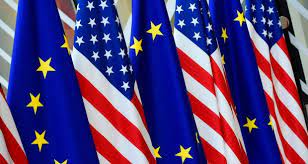Restarting the transatlantic relationship in the global economy
By Dr. Beverly Barrett

The transatlantic relationship is being renewed, as the world emerges from the pandemic. U.S. President Joe Biden’s discourse on his recent travels to Europe indicate a unique commitment to the relationship with partners Europe. Grounded in in decades of cooperation grown out of the partnership of post-World War alliances, the foundation is strong to move forward. This alliance has pillars in health, sustainable, trade and technology.
At the G7 Summit in Cornwall, on the southwest coast of the UK, the U.S. President said repeatedly that “America is Back” at the table and ready to engage with its allies and the world. This indicates that the US is ready to negotiate and to be a partner with the industrialized democracies. When President Biden spoke after the G-7 Summit, he underscored the responsibilities, and the imperative, for democracies to step up and deliver for the rest of the world. There is a clear recognition that we must manage the pandemic before we are able to manage the global recovery.
The U.S. leadership with the Biden administration in 2021 has used discourse to affirm the importance of the transatlantic relationship and working together with allies. During his inauguration address on January 21, the new U.S. president stated: “We will repair our alliances and engage with the world once again. Not to meet yesterday’s challenges, but today’s and tomorrow’s challenges. And we’ll lead, not merely by the example of our power, but by the power of our example. We’ll be a strong and trusted partner for peace, progress and security.”
Last December the European Commission presented the policy document, “A new EU-US agenda for global change,” that proposes a roadmap for a new transatlantic agenda for global cooperation. The EU has introduced new language on “European Strategic Autonomy.” This means that the EU embraces its freedom to pursues policies that are in its interests as a partner. This key signaling language, with European Strategic Autonomy, implies a bold role for the EU in the world.
The return to valuing alliances and to global engagement restores more robust participation and engagement with global institutions. This G7 meeting, the first face-to-face meeting of leaders post-pandemic, focused on countering the rise of China. The leaders agree to reform international tax laws with a global minimum corporate tax, following the proposal from the Finance Ministers and Central Bankers the week prior. The openness to cooperation in global sustainability is evident with the U.S. return to the Paris Accord Agreement of the UNFCCC on February 19. The EU recent dialogue in sustainability has proposed a system of border credits. Prior undertakings with the Emissions Trading System (ETS), set up in 2005 as the world’s first international emissions trade system, provided policy entrepreneurship as far as how to price carbon.
The EU-US Summit in Brussels is an opportunity for the U.S. to engage on issues of national security and global impact, following up on the key democratic principles put forward at the G7 meeting. The following day in Geneva, President Biden’s meeting is the fifth time a U.S. president meets with Russia leader President Vladimir Putin, who has been in power for more than two decades. The U.S. presses for consistency with international legal norms given recent cyberthreats that have come from Russia.
Meeting the global need for infrastructure, the Build Back Better for the World (B3W) partnership from the G7 will balance some of the needs of developing countries that have turned to financing from China with the One Belt One Road. The B3W is a climate-friendly and transparent alternative to move forward with support from the industrialized democracies. This values-driven, high standard financing mechanism has four key areas: Climate, health, digital technology and gender equity. These correspond with the UN Sustainable Development Goals (SDGs). The 17 goals were agreed to in 2015 as objectives for UN members to work toward. Specifically, the potential alignments are as follows: Climate (SDGs 7 and 13), health (SDG 3), digital technology (SDGs 8 and 9) and gender equity (SDG 5).
As we restart and advance technologies, in meeting tomorrow’s challenges, let us keep in mind the importance of serving human purposes in moving forward. Policies should reinforce the dignity of the human person and maintain the principle of human agency in technological development. The agenda provided by “AI for Good” collaborates with the UN SDGs and underscores the principles of Isaac Asimov’s laws of robotics.
Democratic values that promise to be acted upon in this partnership are as follows: 1) Fighting climate change with global partners, 2) Delivering vaccines, ending the pandemic and being prepared for future pandemics, 3) Fueling infrastructure development and digital technologies in places that most badly need it with a financial alternative that is sustainable and transparent (B3W), and 4) Driving inclusive and equitable economic recovery around the world, supported by the minimum global corporate tax proposed. Th G7 leaders will advocate for these initiatives at home at the national level of the policy process. The UN Conference of Parties (COP26) in Glasgow in early November will be another opportunity to advance these values toward sustainable development. To better serve the world, restarting the transatlantic relationship can be a robust engine to drive forward democratic values
University of St.Thomas – CSB, Lecturer in Dept. of Economics
Email address: barretbf@stthom.edu